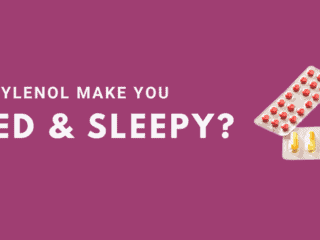The following serious adverse reactions of Cyclobenzaprine are discussed in greater detail in other sections:
- Drowsiness
- Dry Mouth
- Fatigue
- Headache
- Dizziness
- Confusion
- Irritability
- Nervousness
- Heartburn
Note this may not be a complete list of side effects.
The following information comes from DailyMed, an FDA-approved resource for drug labeling.
Incidence of most common adverse reactions in 2 double-blind, placebo-controlled 5 mg studies (incidence of > 3% on FLEXERIL 5 mg):
Clinical Studies with FLEXERIL 5 mg:
Drowsiness 29%
Dry Mouth 21%
Fatigue 6%
Headache 5%
Clinical Studies with FLEXERIL 10 mg:
Drowsiness 38%
Dry Mouth 32%
Fatigue 6%
Headache 5%
Placebo:
Drowsiness 10%
Dry Mouth 7%
Fatigue 3%
Headache 8%
The following list of adverse reactions is based on the experience in 473 patients treated with FLEXERIL 10 mg in additional controlled clinical studies, 7607 patients in the post-marketing surveillance program, and reports received since the drug was marketed. The overall incidence of adverse reactions among patients in the surveillance program was less than the incidence in controlled clinical studies.
The adverse reactions reported most frequently with FLEXERIL were drowsiness, dry mouth, and dizziness. The incidence of these common adverse reactions was lower in the surveillance program than in the controlled clinical studies:
Clinical Studies with FLEXERIL 10 mg:
Drowsiness: 39%
Dry Mouth: 27%
Dizziness: 11%
Surveillance Program with FLEXERIL 10 mg:
Drowsiness: 16%
Dry Mouth: 7%
Dizziness: 3%
Among the less frequent adverse reactions, there was no appreciable difference in incidence in controlled clinical studies or in the surveillance program. Adverse reactions that were reported in 1% to 3% of the patients were:
- Fatigue/tiredness
- Asthenia
- Nausea
- Constipation,
- Dyspepsia
- Unpleasant taste
- Blurred vision
- Headache
- Nervousness
- Confusion
The following adverse reactions have been reported in post-marketing experience or with an incidence of less than 1% of patients in clinical trials with the 10 mg tablet:
- Body as a Whole: Syncope; malaise.
- Cardiovascular: Tachycardia; arrhythmia; vasodilatation; palpitation; hypotension
- Digestive: Vomiting; anorexia; diarrhea; gastrointestinal pain; gastritis; thirst; flatulence; edema of the tongue; abnormal liver function and rare reports of hepatitis, jaundice, and cholestasis.
- Hypersensitivity: Anaphylaxis; angioedema; pruritus; facial edema; urticaria; rash.
- Musculoskeletal: Local weakness.
- Nervous System and Psychiatric: Seizures, ataxia; vertigo; dysarthria; tremors; hypertonia; convulsions; muscle twitching; disorientation; insomnia; depressed mood; abnormal sensations; anxiety; agitation; psychosis, abnormal thinking, and dreaming; hallucinations; excitement; paresthesia; diplopia.
- Skin: Sweating.
- Special Senses: Ageusia; tinnitus.
- Urogenital: Urinary frequency and/or retention.
Other reactions, reported rarely for FLEXERIL under circumstances where a causal relationship could not be established or reported for other tricyclic drugs, are listed to serve as alerting information to physicians:
- Body as a whole: Chest pain; edema.
- Cardiovascular: Hypertension; myocardial infarction; heart block; stroke.
- Digestive: Paralytic ileus, tongue discoloration; stomatitis; parotid swelling.
- Endocrine: Inappropriate ADH syndrome.
- Hematic and Lymphatic: Purpura; bone marrow depression; leukopenia; eosinophilia; thrombocytopenia.
- Metabolic, Nutritional, and Immune: Elevation and lowering of blood sugar levels; weight gain or loss.
- Musculoskeletal: Myalgia.
- Nervous System and Psychiatric: Decreased or increased libido; abnormal gait; delusions; aggressive behavior; paranoia; peripheral neuropathy; Bell’s palsy; alteration in EEG patterns; extrapyramidal symptoms.
- Respiratory: Dyspnea.
- Skin: Photosensitization; alopecia.
- Urogenital: Impaired urination; dilatation of urinary tract; impotence; testicular swelling; gynecomastia; breast enlargement; galactorrhea.
Disclaimer: this article does not constitute or replace medical advice. If you have an emergency or a serious medical question, please contact a medical professional or call 911 immediately. To see our full medical disclaimer, visit our Terms of Use page.





